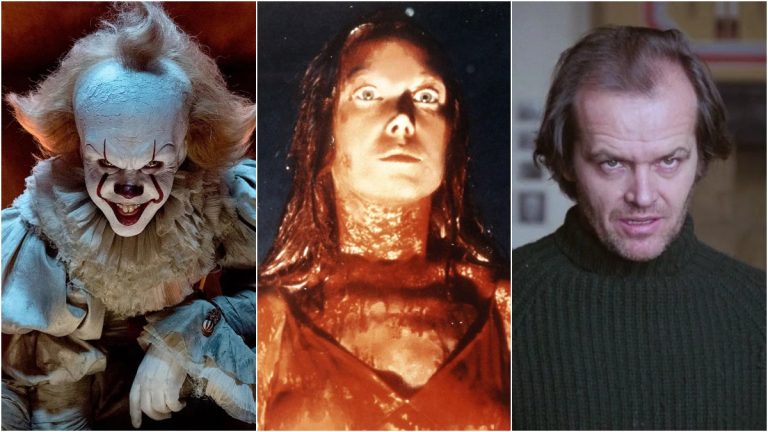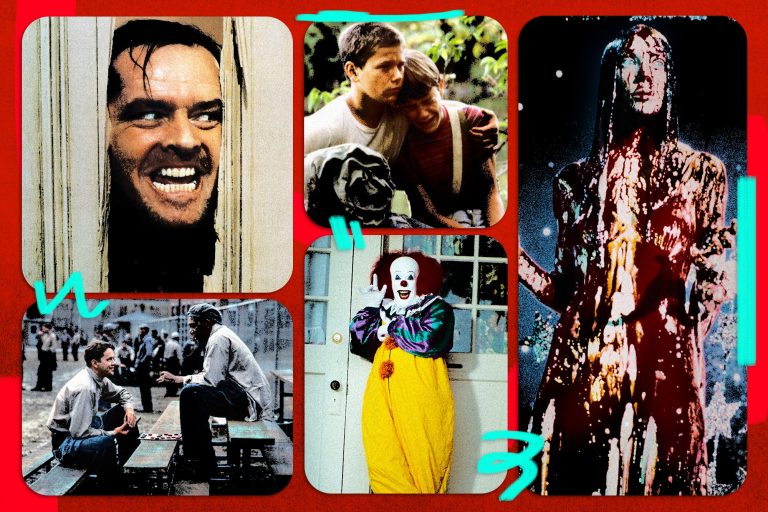Are There Any Stephen King Movies That Deviate From The Source Material?
If you’re a fan of Stephen King’s work, you may have wondered if any of his beloved books have been adapted into movies that stray from the original source material. Well, get ready for some surprises because there are indeed Stephen King movies that deviate from their literary counterparts. While some adaptations stay true to the books, others take creative liberties to bring the stories to life on the big screen. So, if you’re curious about which Stephen King movies have taken a different path, grab some popcorn and let’s dive in!
One example of a Stephen King movie that deviates from the source material is “The Shining.” While the film, directed by Stanley Kubrick, is considered a classic in the horror genre, it differs significantly from King’s novel. In the book, the character of Jack Torrance is portrayed as a sympathetic figure struggling with his inner demons. However, in the movie, Jack Nicholson’s portrayal of Jack Torrance takes a more sinister turn, emphasizing his descent into madness. Additionally, the conclusion of the film differs from the book, leaving audiences with a more ambiguous and haunting ending. Despite these deviations, “The Shining” remains a chilling and iconic film that has left a lasting impact on viewers.
So, if you’re a fan of Stephen King’s work and enjoy seeing how his stories are brought to life on the silver screen, keep an eye out for those adaptations that deviate from the source material. They offer a fresh perspective and can provide a new and exciting experience even for die-hard fans of the books. Whether you prefer the faithfulness of a true-to-the-book adaptation or the thrill of seeing a story unfold in unexpected ways, there’s something for everyone in the world of Stephen King movies.

Stephen King Movies: Do They Stay True to the Source Material?
Stephen King is a prolific author known for his gripping and terrifying novels. Many of his books have been adapted into movies, captivating audiences with their dark and suspenseful stories. However, fans often wonder if these film adaptations stay faithful to the source material. Are there any Stephen King movies that deviate from the original books? Let’s take a closer look.
Adapting King’s Novels for the Silver Screen
When a Stephen King novel is chosen for a film adaptation, there are several factors that come into play. Directors, screenwriters, and producers must make decisions on how to condense the story, which scenes to include, and how to capture the essence of King’s writing style. While some movies stay true to the source material, others take creative liberties to enhance the cinematic experience.
In many cases, filmmakers strive to remain faithful to the original story. They understand the importance of preserving the elements that made the book so captivating in the first place. However, due to time constraints and the limitations of the medium, some changes are inevitable. These changes can range from minor alterations to major deviations from the source material.
Examples of Movies That Stay True to the Source Material
Several Stephen King movies have successfully captured the essence of the original novels. One such example is “The Shawshank Redemption,” based on King’s novella “Rita Hayworth and Shawshank Redemption.” The film remains faithful to the core storyline and the characters’ arcs, immersing viewers in the gritty world of Shawshank State Penitentiary. The movie’s critical acclaim and enduring popularity are a testament to its ability to stay true to the source material.
Another movie that stays remarkably true to the book is “Misery,” based on King’s novel of the same name. The film adaptation captures the psychological horror of the story, showcasing the twisted relationship between an obsessed fan and her captive author. The performances of Kathy Bates and James Caan further enhance the chilling atmosphere, making “Misery” a standout adaptation.
Deviation from the Source Material
While many Stephen King movies remain faithful to the original novels, there are instances where significant deviations occur. Directors and screenwriters sometimes make creative choices to enhance the storytelling or to appeal to a wider audience. These changes may alter the plot, characters, or themes of the original story.
One example of a movie that deviates from the source material is Stanley Kubrick’s adaptation of “The Shining.” While King’s novel explores the slow descent into madness of the Torrance family, Kubrick’s interpretation takes a more abstract and psychological approach. The film focuses heavily on the atmospheric horror, leaving out certain plot elements and character motivations present in the book.
Another movie that takes liberties with the source material is “Carrie,” directed by Brian De Palma. While the film captures the main narrative of a high school outcast with telekinetic powers, it alters the ending and omits certain subplots found in the novel. These changes give the movie a different tone and reveal the director’s creative vision.
Despite these deviations, both “The Shining” and “Carrie” are regarded as iconic horror films in their own right. They showcase the interpretative nature of adaptations and how filmmakers can put their own stamp on the source material.
Understanding the Purpose of Adaptations
It’s important to remember that film adaptations are a separate art form from the original novels. While fans may have certain expectations, filmmakers have their own creative vision and must make choices that best suit the medium. Movies allow for visual storytelling and the inclusion of elements that may not translate directly from the written word.
Adaptations can also introduce the work of Stephen King to new audiences who may not have read the books. By crafting a compelling cinematic experience, filmmakers can spark interest in the source material and encourage viewers to delve deeper into King’s vast literary universe.
Conclusion
When it comes to Stephen King movies, there is a delicate balance between staying true to the source material and allowing for creative interpretation. While some adaptations faithfully capture the essence of the novels, others take liberties to enhance the cinematic experience. Both approaches have their merits, providing audiences with unique and captivating stories. Ultimately, whether a movie deviates from the source material or not, what matters most is the ability to captivate and engage viewers, leaving a lasting impression just like King’s unforgettable novels.
Key Takeaways: Are there any Stephen King movies that deviate from the source material?
- Some Stephen King movies deviate from the source material to add new elements or enhance the cinematic experience.
- The changes in the movies can range from minor alterations to major plot deviations.
- These deviations can be divisive among fans who are loyal to the original story.
- However, some deviations are well-received and are considered successful adaptations in their own right.
- Overall, the decision to deviate from the source material depends on the filmmakers’ vision and the audience’s reception.
Frequently Asked Questions
Stephen King is one of the most celebrated authors in the horror genre, and many of his novels have been adapted into movies. Fans often wonder if these movies stay faithful to the source material. Here are some frequently asked questions about Stephen King movies and how they deviate from the original books.
1. Do all Stephen King movies stay true to the source material?
While some Stephen King movies closely follow the original books, there are certainly instances where deviations occur. Filmmakers often make changes to adapt the story for the screen or to add their own creative touch. These changes can range from minor alterations to major plot divergences. However, it’s important to note that not all deviations are seen as negative. Some adaptations have been praised for their unique interpretation of the source material.
One example of a Stephen King movie that deviates from the source material is “The Shining” directed by Stanley Kubrick. While the film is highly regarded and considered a classic, it differs significantly from the novel in terms of character motivations and certain plot elements. Stephen King himself has been vocal about his dissatisfaction with the adaptation.
2. Why do filmmakers deviate from the source material?
Filmmakers may deviate from the source material for various reasons. One common reason is the need to condense a lengthy novel into a manageable runtime for a movie. Certain subplots or characters might be omitted or altered to streamline the story. Additionally, filmmakers may want to put their own creative spin on the material, adding new elements or changing certain aspects to make the movie more visually appealing or engaging for audiences.
Another factor that can contribute to deviations is the difference in storytelling mediums. What works on the pages of a book might not translate directly to the screen, and filmmakers may need to make adjustments to ensure the story is effectively told in a visual format.
3. Are there any Stephen King movies that improve upon the source material?
While opinions may vary, some Stephen King movies have been praised for improving upon the source material. Filmmakers have the opportunity to enhance certain aspects of the story through visual effects, performances, and other cinematic techniques. These adaptations can bring a fresh perspective to the narrative and resonate with audiences in ways that the original book might not have achieved.
One example of a Stephen King movie that is often cited as an improvement upon the source material is “The Shawshank Redemption.” The film expands on the novella “Rita Hayworth and Shawshank Redemption,” adding depth to the characters and exploring themes of hope and redemption in a more impactful way.
4. How do Stephen King fans react to deviations in movie adaptations?
Stephen King fans have a wide range of reactions to deviations in movie adaptations. Some fans appreciate the opportunity to see a fresh take on the story and embrace the creative liberties taken by filmmakers. Others may be more critical and prefer adaptations that closely adhere to the source material. The reaction often depends on individual preferences and how attached fans are to the original book.
It’s worth mentioning that Stephen King himself has expressed mixed feelings about certain adaptations of his work. While he acknowledges the creative process and understands the need for changes, he has also been vocal about his disappointment with certain deviations from his original vision.
5. Can deviations in Stephen King movies affect the overall enjoyment of the film?
Deviation from the source material can certainly impact the overall enjoyment of a Stephen King movie, especially for fans of the original book. Some viewers may feel that the changes alter the essence of the story or omit important elements that they loved in the book. However, it’s important to approach adaptations with an open mind and appreciate them as separate entities from the source material.
Ultimately, the enjoyment of a Stephen King movie depends on individual preferences and the ability to separate the book from its adaptation. Some viewers may appreciate the unique perspective brought by the filmmakers, while others may prefer a more faithful rendition of the original story.
Needful Things 1993 2160p 4K AI Upscaled (Full Movie) (Stephen King)
Final Thoughts
So, are there any Stephen King movies that deviate from the source material? The answer is a resounding yes! While many film adaptations stay true to the original story, there are several instances where filmmakers have taken creative liberties and made changes to the source material. These deviations can range from minor alterations to major plot changes, but they all serve one purpose: to bring the story to life in a new and exciting way on the big screen.
One notable example is the film “The Shining,” directed by Stanley Kubrick. While Stephen King’s novel of the same name is a psychological horror masterpiece, Kubrick’s adaptation took a slightly different approach. The film diverged from the book in terms of character development and omitted certain key elements. This deviation created a distinct cinematic experience that showcased Kubrick’s unique vision while still capturing the essence of King’s chilling tale.
Another example is the recent adaptation of “It.” Director Andy Muschietti took Stephen King’s massive novel and condensed it into two films, focusing primarily on the characters’ experiences as children. This deviation allowed for a more streamlined narrative and allowed the filmmakers to delve deeper into the emotional journey of the main characters. While some fans of the book may have been initially skeptical of this approach, the films were widely praised for their ability to capture the essence of King’s storytelling while still offering something new and fresh.
In conclusion, it’s clear that deviations from the source material can be both exciting and necessary when it comes to bringing Stephen King’s stories to the big screen. Filmmakers have the unique opportunity to interpret the source material and create a visual experience that complements and enhances the original work. While purists may prefer strict adherence to the source material, these deviations often result in memorable and beloved films that stand on their own. So, the next time you watch a Stephen King adaptation, keep an open mind and embrace the creative choices made by the filmmakers. You may just discover a new perspective on a familiar story.






